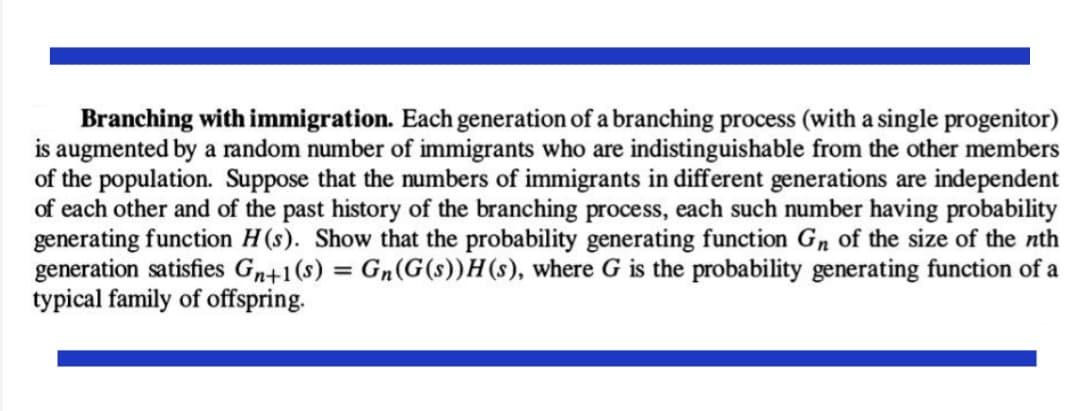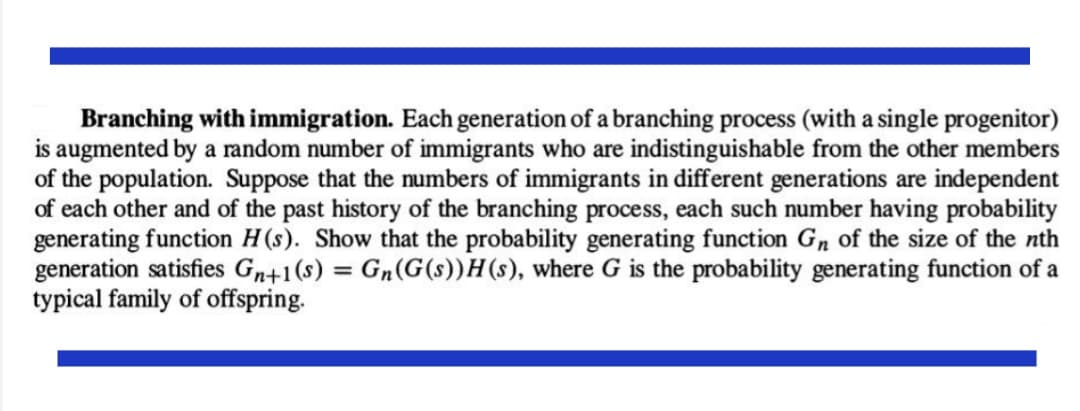Branching with immigration. Each generation of a branching process (with a single progenitor) is augmented by a random number of immigrants who are indistinguishable from the other members of the population. Suppose that the numbers of immigrants in different generations are independent of each other and of the past history of the branching process, each such number having probability generating function H(s). Show that the probability generating function Gn of the size of the nth generation satisfies Gn+1(s) = Gn (G(s))H(s), where G is the probability generating function of a typical family of offspring.
Branching with immigration. Each generation of a branching process (with a single progenitor) is augmented by a random number of immigrants who are indistinguishable from the other members of the population. Suppose that the numbers of immigrants in different generations are independent of each other and of the past history of the branching process, each such number having probability generating function H(s). Show that the probability generating function Gn of the size of the nth generation satisfies Gn+1(s) = Gn (G(s))H(s), where G is the probability generating function of a typical family of offspring.
Algebra & Trigonometry with Analytic Geometry
13th Edition
ISBN:9781133382119
Author:Swokowski
Publisher:Swokowski
Chapter10: Sequences, Series, And Probability
Section10.8: Probability
Problem 56E
Related questions
Question

Transcribed Image Text:Branching with immigration. Each generation of a branching process (with a single progenitor)
is augmented by a random number of immigrants who are indistinguishable from the other members
of the population. Suppose that the numbers of immigrants in different generations are independent
of each other and of the past history of the branching process, each such number having probability
generating function H(s). Show that the probability generating function Gn of the size of the nth
generation satisfies Gn+1(s) = Gn(G(s))H(s), where G is the probability generating function of a
typical family of offspring.

Transcribed Image Text:Branching with immigration. Each generation of a branching process (with a single progenitor)
is augmented by a random number of immigrants who are indistinguishable from the other members
of the population. Suppose that the numbers of immigrants in different generations are independent
of each other and of the past history of the branching process, each such number having probability
generating function H(s). Show that the probability generating function Gn of the size of the nth
generation satisfies Gn+1(s) = Gn(G(s))H(s), where G is the probability generating function of a
typical family of offspring.
Expert Solution
This question has been solved!
Explore an expertly crafted, step-by-step solution for a thorough understanding of key concepts.
This is a popular solution!
Trending now
This is a popular solution!
Step by step
Solved in 2 steps with 2 images

Recommended textbooks for you

Algebra & Trigonometry with Analytic Geometry
Algebra
ISBN:
9781133382119
Author:
Swokowski
Publisher:
Cengage

Functions and Change: A Modeling Approach to Coll…
Algebra
ISBN:
9781337111348
Author:
Bruce Crauder, Benny Evans, Alan Noell
Publisher:
Cengage Learning

Algebra & Trigonometry with Analytic Geometry
Algebra
ISBN:
9781133382119
Author:
Swokowski
Publisher:
Cengage

Functions and Change: A Modeling Approach to Coll…
Algebra
ISBN:
9781337111348
Author:
Bruce Crauder, Benny Evans, Alan Noell
Publisher:
Cengage Learning